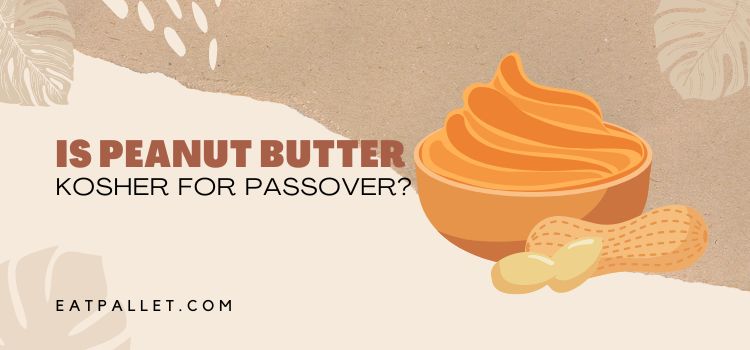Last Updated on July 15, 2024 by Shari Mason
Passover, a beloved Jewish holiday, comes with **strict dietary rules**. Many foods get avoided, and only specific ingredients can be eaten.
Peanut butter is a typical food that raises questions about its permissibility during Passover. Peanut butter is a popular spread that contains peanuts, salt, and sometimes additional ingredients like sugar or oil.
We will explore whether peanut butter is kosher for Passover and the factors determining its permissibility.
Is Peanut Butter Considered Kosher For Passover?


The permissibility of peanut butter during Passover depends on its ingredients. If the peanut butter is made with only peanuts [1] and salt, it may be permissible during Passover.
However, it would not be considered permissible if it contains any added ingredients that are not kosher for Passover, such as non-Passover-approved oils or sugars.
The use of utensils and equipment must also be considered, as they must be designated as kosher for Passover and not used with chametz or kitniyot.
Those observing Passover should consult with a rabbi or knowledgeable authority on Jewish dietary laws to ensure that the peanut butter they consume is permissible in their community.
Related Articles:
- Are Pistachios Kosher For Passover?
- Are Peanuts Kosher For Passover?
- Is Pasta Kosher For Passover?
- Are Potatoes Kosher For Passover?
- Is Soy Sauce Kosher For Passover?
What Are The Ingredients In Peanut Butter?
Peanut butter is typically made with roasted peanuts, salt, and oil. The type of oil used can vary depending on the brand and the desired consistency.
Some brands may use palm oil [2] or hydrogenated vegetable oil, while others may use peanut oil or other types of vegetable oils.
Some brands may add sugar or other sweeteners to their peanut butter.
It is essential to check the label and ingredients list to ensure that the peanut butter is made with kosher and permissible Passover ingredients if consumed during the holiday.
Can It Be Used In Passover Recipes?


Suppose peanut butter is considered permissible during Passover. In that case, it can be used in Passover recipes if it is prepared with Passover-approved ingredients and utensils and not contaminated by chametz or non-kosher ingredients.
Peanut butter can spread matzah, baked goods, or other recipes during Passover.
“ I’m going to take this God-given gift of being funny, and I’m going to spread it out like peanut butter on everything I do.”
– Steve Harvey, TV Host
When using peanut butter in Passover recipes, it is essential to ensure that the other ingredients used are kosher for Passover and do not contain chametz or kitniyot.
Those observing Passover should consult with a rabbi or knowledgeable authority on Jewish dietary laws to ensure that the peanut butter and any recipes made with it are permissible in their community.
Alternatives To Peanut Butter For Passover
Several alternatives are available for those who do not consume peanut butter during Passover. Some options include almond butter, cashew butter, sunflower seed butter, or sesame (tahini).
These alternatives should be made with kosher-for-Passover ingredients and prepared following Passover dietary laws.
It is essential to check the label and ingredients list to ensure that the alternative nut or seed butter is permissible during Passover.
Some brands may also produce Passover-approved nut and seed butter certified as kosher for Passover by a reliable authority.
FAQs
u003cstrongu003eWhat nuts are kosher for Passover?u003c/strongu003e
Generally, most nuts are considered kosher for Passover. This includes almonds, cashews, hazelnuts, macadamia nuts, pecans, pistachios, and walnuts. u003cbru003eu003cbru003eHowever, ensuring that the nuts have not come into contact with chametz or kitniyot during processing is essential. Any added ingredients or flavors must also be kosher for Passover.
u003cstrongu003eWhat butter is kosher for Passover?u003c/strongu003e
In general, unsalted butter made with milk from kosher-for-Passover animals is considered permissible during Passover. u003cbru003eu003cbru003eHowever, some communities may prohibit the consumption of dairy products altogether during Passover. In contrast, others may only allow the consumption of dairy products certified as kosher for Passover by a reliable authority.
u003cstrongu003eIs almond butter kosher for Passover?u003c/strongu003e
Almond butter can be kosher for Passover if made with kosher-for-Passover almonds and not processed with chametz or kitniyot.
Final Thoughts
Whether peanut butter is kosher for Passover depends on its ingredients and preparation. It may be considered permissible if it is made with only peanuts and salt, without any added oils or sugars that are not kosher for Passover.
However, it is essential to ensure that the peanuts used to make the peanut butter were not processed with chametz or kitniyot and that any utensils used to serve or prepare the peanut butter are designated kosher for Passover and not used with chametz or kitniyot.
Those who observe Passover should consult with a rabbi or knowledgeable authority on Jewish dietary laws to determine the permissibility of peanut butter during Passover in their specific community.
If allowed, it must be consumed following Passover restrictions and not in combination with chametz or kitniyot.
Alternatively, several alternatives to peanut butter, such as almond butter or sunflower seed butter, may be permissible during Passover.
References:
- https://www.healthline.com/nutrition/foods/peanuts
- https://www.health.harvard.edu/staying-healthy/by-the-way-doctor-is-palm-oil-good-for-you
- How to Cancel a Pizza Hut Order? Quick & Easy Guide - July 26, 2024
- How Long Do I Cook a DiGiorno Pizza? Perfect Timing Tips - July 26, 2024
- What Kind of Advertising Do Restaurants Use? - July 24, 2024

